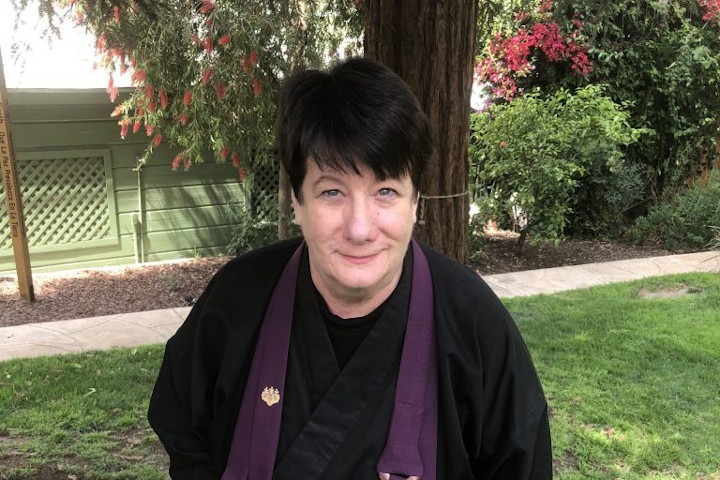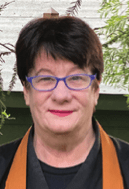
Have You Eaten?
October 1, 2023
 by Katherine Senshin Griffith
by Katherine Senshin Griffith
Tanka asked a monk, “Where have you come from?”
The monk replied, “From the foot of the mountain.”
Tanka said, “Have you eaten yet?” The monk said, “I have.”
Tanka said, “Was the person who brought the rice, gave it to you, and had you eat it, open-eyed?”
The monk could make no reply.
Later, Chokei asked Hofuku, “To give food to others is surely worthy. How could he fail to be open-eyed?”
Hofuku said, “Both giver and receiver are blind.”
Chokei said, “If they used all their potential, would they still be blind?”
Hofuku said, “Can you call me blind?”
– Blue Cliff Case 76
In Zen Practice, many meals are offered. Not just the food we eat together but the Supreme Meal of the Awak- ened Mind.
The above Zen dialogue reflects both aspects of the one reality. Tanka is asking the newcomer, “Have you had your dinner, or do you need us to provide you with some nourishment?” He is also asking, “Have you had your spiritual food? Have you awakened?” Was the monk saying he had eaten or that he was awake? Either way, he was stumped when asked, “Was the person who brought the rice, gave it to you, and had you eat it, open-eyed?”
This issue of the Water Wheel is a feast devoted to exploring the tenzo sphere, the practice of preparing meals for the Sangha. Tenzo is the title of the head chef at a Zen monastery and means “seat of ceremony,” in Japanese. Similar to our term “master of ceremonies,” the tenzo office has been held by awakened or senior practitioners who oversee with reverence the Sangha’s meals, with the intention of rousing the Bodhi-Mind. At ZCLA, the tenzo position is held by various members who step up to serve. Besides the role of head cook, we are all called to assist in cooking, shopping, and clean-up.
In a remote monastery setting, monks would be trained to give a wholehearted “yes,” to whatever assignment they were given, including all kitchen and clean-up duties. In our contemporary urban lay practice, it’s easy to fall into picking and choosing. True, we have to meet the demands of our householder lives, but how do we make seamless the boundaries of our practice? How do we help meet Zen Center needs, given the varied conditions of our individual lives, without falling into “not here, not now, not me.” How can we raise the Bodhi-Mind wherever we are and with whatever we are doing? As with all our activities, it’s crucial to know with what mind we prepare, serve, and receive our meals. No job is too menial. Before he became the Sixth Zen Ancestor, Hui-Neng pounded rice.
This is so much more than just being mindful in the kitchen.

Wrapped oryoki bowls set out for sesshin.
A necessity for life, the realm of food is already rich and extensive. Eating is one of life’s greatest pleasures. We humans have invented myriad delicious ways of preparing our sustenance, making it sometimes irresistible. We eat not just to survive but to celebrate being alive. Communal meals are a form of deep connection with each other, often central to marking major milestones. Since ancient times, feasts have been held to acknowledge the bounty of the harvest. In concentration camps, sharing a meager morsel was a way of retaining your humanity. Hunger strikes have been undertaken to fight for key human rights. In Zen, we eat to serve all beings.
This year for sesshins, we have returned to our oryoki meals, which had been curtailed due to the pandemic. In this three-bowl ritual practice, we take just enough and stay in sync with everyone else by not lingering in our eating. We unify our minds and close the gap between giver, receiver, and gift.
Later, Chokei asked Hofuku, “To give food to others is surely worthy. How could he fail to be open-eyed?” Hofuku said, “Both giver and receiver are blind.”
What is this blindness? According to Yatsutani Roshi, there are five kinds of Zen blindness. 1) The blindness of the ordinary unenlightened one who has no eye at all for the Dharma. 2) “Obstruction blindness” which includes all deluded thoughts, philosophies and distinctions which prevent us from seeing things as they really are. 3) The blindness of the sincere practitioner who is still missing something. 4) “Authentic blindness” where we encounter the essential world and can see nothing because there is nothing to see. 5) “True blindness” where even the eye of satori is blind and we become completely ordinary. This is “the eye of the Buddhas of the Three Worlds.”
With what eye do you greet all the elements of your life? How are you blind? Have you eaten? If you used all your potential, would you still be blind? Does Buddha recognize Buddha? Or are you still hungry and unsatisfied?
Most Sundays, in the Gate of Sweet Nectar service, we invite all Hungry Spirits throughout space and time, filling the smallest particle to the largest space, to join us for the Supreme Meal. We too have hungry ghosts inside us, where nothing satisfies, and thirsts can’t be quenched. We also bring food for the local food bank and place it on the altar. In this ritual feeding, we acknowledge both the physical and the spiritual aspects of life. By raising the Bodhi Mind, we realize we are already completely fed, completely Buddha, just as we are. Open-eyed, we see both giver and receiver are blind, because there is nothing to see.

Dharma Holder Jitsujo feeding the Hungry Ghosts.
I am very grateful to all who have prepared and served me wonderful meals throughout my life, especially all who have served as tenzos. I am not a good cook by any means, but I have appreciated and grown when I have been asked to contribute to Sangha meals. I’m also grateful for all the Dharma teachings I have digested. This feeling of gratitude drives me to give my all to this precious life I’ve been given and serve in the best way I can. I want to be totally used up when I die. I’ve often declared that I want my corpse to be left out for the buzzards to eat, but I’m not sure I can get Sensei Myoho to go along with that wish.
The instruction to this Case, reads:
It is as fine as rice powder, it is as cold as ice and frost. It completely fills the universe, leaving bright and transcending dark. If you look at it when it is very low, there is something extra. If you level it when it is very high, it is not enough. Holding fast and letting go…all are within his reach. Is there, however, a place to completely reveal the body or not?
The one body is revealed right here, right now. If you can, stretch yourself and offer to help cook and clean-up for a Sangha meal. Offer to take on a service position, as we serve the Supreme Meal. Let’s all close the gap, uniting with our Bodhi-Mind, finer than the finest rice powder, that fills every particle of this Boundless Universe.
May all creations throughout space and time, receive our offerings and be thoroughly satisfied.
Have you eaten?
Sensei Senshin is the ZCLA Head Teacher.
